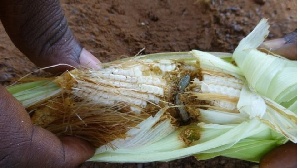Three basic-school students in the Nabdam District of the Upper East region have come up with a chemical they claim is an answer to fall armyworm attack.
The invention, credited to Joseph Adule Aberika and Elizabeth Nagroug from the Kongo Junior High School and Elizabeth Bugre from the Presentation Junior High School, comes after a nationwide armyworm raid on farmlands had set government’s teeth on edge.
Scores of educationists greeted the invention with applause at the 7th Regional Science, Technology, Mathematics and Innovation Education (STMIE) Camp held in Bolgatanga, the regional capital, where the students displayed the chemical and explained how it worked.
“We made a garden. We tested it. It drove away the [armyworms] but they came back to destroy the maize. It is used temporarily, not permanently,” explained Elizabeth Nagroug.
The discovery, according to the students, calls for government to support their school with a science laboratory so they could do further research to arrive at an anti-armyworm chemical with a concrete potency.
The students also developed a repellent meant to ward off mosquitoes and a biogas made with cow dung to help discourage the felling of trees for wood fuel.
“Malaria is a disease that kills about 40% of the population of the world. Mosquitoes hate some scents. So, we decided to use neem, garlic and shea butter to make this repellent,” Elizabeth Bugre said.
Joseph Adule Aberika said the third invention was driven by a passion to support the global crusade on Climate Change.
“This biogas is obtained from the decomposition of cow dung. We came about this because we observed that our parents mostly cut down trees for firewood and charcoal, which can cause desertification. We came about this project to help them stop the cutting down of trees,” he said.
It is a good start - GES lauds invention
The Ghana Education Service (GES) has hailed the invention as “a good start” and called for more research at “a higher level”.
“They’ve done well, looking at their level. They have done well, for them to come up with a chemical. According to the students, it’s harmless because it’s vegetative.
They said they didn’t want to add additional chemical because they didn’t want anything that would be injurious to human beings and maybe the water bodies. They explained that should rain fall and the chemical is very powerful, it’s likely to flow into our water bodies.
“It’s a good step. It’s a good start. And according to them, when they apply, the fall armyworm goes away but it comes back. So, it means they have to reapply. When they get back, they should intensify their research and step up, improve upon it such that it doesn’t drive away the worm alone but should also kill it.
They should sample a small portion and, if possible, contact the teachers. They should it take it up at a higher level,” the Talensi District Director of Education, Stephanie Mosore, remarked.
Help your children to grow their talents - Parents told
The Deputy Minister of Food and Agriculture in charge of Annual Crops, Dr. Sagre Bambangi, toured the region late in August, this year, to ascertain the level of devastation wrecked by the fall armyworms and to observe the efficacy of an anti-armyworm chemical government had provided for farmers.
Subsequently, the ministry also organized a training workshop for some disaster management workers in the region on ways they could help farmers fight back the pests, using chemicals.
The introduction of the ‘latest chemical’ by the students has led organizers of the talent-show event into urging parents to support the gifts in their children to grow.
“Now that you have seen the talents in your child, don’t look at the school. Today, the boy from NAVASCO who had the best in the Senior High [category] is in the UK on scholarship. So, the parents have benefited- not me the regional coordinator nor my national director.
Stakeholders should do their part in order to project Science and Mathematics. They are core subjects,” Faustina Agetara, the Upper East Regional STMIE Coordinator, advised.
Business News of Thursday, 21 September 2017
Source: starrfmonline.com

















